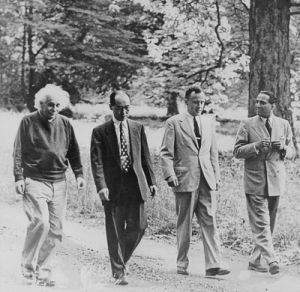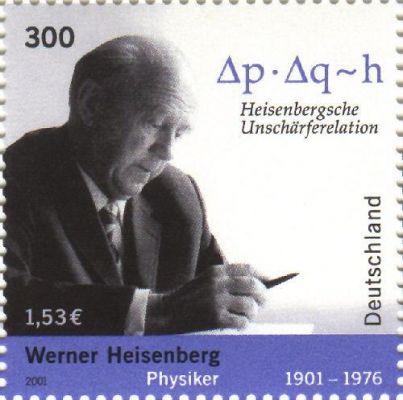I am very happy that my recent posts have attracted attention and provoked response. There is certainly no point in wasting ink (in this case, computer memory) unless it stimulates a lively debate and an open exchange of ideas. I thus read the recent comment on my posts by Prof. Dieter Zeh with great excitement and anticipation. And I was not disappointed.
Dieter's post, among other things, offers a beautiful discussion of different views on quantum mechanics and argues for the preference of Many Worlds Interpretation over other possible interpretations.

Many-Worlds Mario
(Incidentally, for an amusing take on the Many Worlds interpretation, you can watch the superimposed fates of 86 parallel versions of Super Mario.)
In some of my recent posts, I may have given the impression that I am very critical of the Many Worlds Interpretation of quantum mechanics. However, in reality I am a big fan of this interpretation. It, for one, treats a measurement on an equal footing with other processes (and, indeed, why should a measurement be any different?). Secondly, there is a chance that it may please people like Einstein, in that it recovers determinism, since the whole universe evolves in a fully predictable way once measurements have been eliminated (or, rather, they are incorporated into dynamics).
Most researchers in the field of quantum computation, like myself, also tend to prefer the many worlds view (though to be very pedantic, there are many different Many Worlds Interpretations-but let's not open that box). The advantages of a quantum computer are most clearly seen by thinking of each of the many worlds as performing a different classical computation. It is not an accident that the founders of quantum computing, Richard Feynman and David Deutsch (as well as Peter Shor, who discovered the first serious quantum advantage in computing), were supporters of the many worlds interpretation.
Many worlds is frequently criticized on the basis that it cannot explain the probabilities for various outcomes we observe when we measure things. In order to derive probabilities (if we get rid of the measurement postulate) it seems that we need to invoke some additional principles. David Deutsch has argued for some kind of a game theoretic approach and I think his arguments are very convincing. There is also a beautiful way of showing how classicality emerges due to entanglement between the system and the rest of the universe, something leading to decoherence in the system, a powerful approach pioneered by Dieter Zeh himself.
I am also happy to ignore what I think are some other minor problems of Many Worlds, such as the basis problem. There is then the issue of Bell's inequalities, which become meaningless in Many Worlds. This is precisely because Many Worlds eliminates the notion of a measurement. So supporting Many Worlds would only add extra credence to my view that the language used when talking about Bell's inequalities is archaic, it is a relic of a bygone era.

Albert Einstein, Hideki Yukawa, John Wheeler, and Homi Bhabha
However, there is unfortunately one major problem with Many Worlds. I believe that this was first identified by John Wheeler (some might say this was already known to Bohr, but then there was no Many Worlds interpretation at that time).
John Wheeler supervised Hugh Everett, the inventor of the Many Worlds. Initially, Wheeler was said to wholly embrace the interpretation and he even defended it vigorously in a memorable Rev. Mod. Phys. Paper in 1957. A few years later, however, he converted to the Copenhagen view, a conversion whose dramatic element would justify calling it the quantum equivalent of a sex change operation.
Wheeler's logic for conversion is this (I am only guessing here--it is difficult to know how exactly he changed his sex, I mean mind, some 50 years ago). Suppose we would like to push our scientific understanding of the world as far as possible, as Wheeler no doubt wanted to do. Then we always hit a barrier and this barrier is the laws of physics themselves, which cannot be explained from anything more fundamental. Take the Many Worlds version of quantum physics. We need to know the wavefunction of the Universe (to borrow James Hartle and Stephen Hawking's memorable paper title) as well as the Hamiltonian of the Universe. Once we have this, we can predict the rest using dynamical laws. But where do all these three entities (the wavefunction, the Hamiltonian and the dynamical laws) come from in the first place?
If we are to understand everything in the Universe, we have to explain how the laws of physics arise from no laws of physics ("law without law" was Wheeler's way of putting it). And this to Wheeler (and not only to him) suggested that there must be some random element, something spontaneous not governed by the laws, that predates and underpins everything we see around us. And once we make this statement, namely that randomness is crucial, we are then only one short step away from the Copenhagen interpretation. This is because Copenhagen puts a special emphasis on the random nature of measurement outcomes. The said step may be short, of course, but we still don't know how to take it--Copenhagen itself cannot explain how to get "law without law".

Most physicists, myself included, are opportunists. We use the view that works the best for whatever it is we need to achieve, calculate, explain, elucidate. In that sense Heisenberg's "Machiavellian" philosophy is closest to us. In his classic analysis of the alpha particle going through a cloud chamber, Heisenberg clearly demonstrates his detachment from interpretation, or even, better, his fluidity in moving from one interpretation to another. (Incidentally, the American Institute of Physics has a sound clip of Heisenberg chatting about the development of the uncertainty principle, which is fun to listen to.)
I encourage you to read this directly from his 1930 book on quantum mechanics, but here is a summary if you don't have time (or can't be bothered!).
Heisenberg first assumes that the alpha particle is quantum while the atoms in the cloud chamber are classical. He then calculates probabilities for various trajectories that the alpha particle can take in the chamber (he concludes that the straight line is the most likely path). And now comes the cool bit. Heisenberg goes on to say (I am paraphrasing to make him sound really cool): "You may not like the fact that the atoms in the chamber are assumed to be classical. No worries! Let us assume that they are all quantum!". So in one short paragraph Heisenberg changes with ease from what one would call a Copenhagen view (the system--the alpha particle- is quantum, but the apparatus- the cloud chamber- is classical) to what we would now call Many Worlds (everything is quantum, both the alpha particle and the chamber). And the punch line is that the fully quantum treatment leads to the same result as before.
We all know this should be the case as various interpretations cannot be discriminated experimentally. But, as I emphasized, different interpretations do lead to different attitudes, which may determine the future or our research directions (it is difficult to imagine that a Copenhagen "dogmatist" would ever come up with the idea of quantum computation). This is why I think it is advisable for each physicist to hold the multitude of different interpretations of quantum physics and be able to use them proficiently. Dogmatically holding onto one interpretation can only lead to the poverty of thought. Richness, as always, is in the diversity.